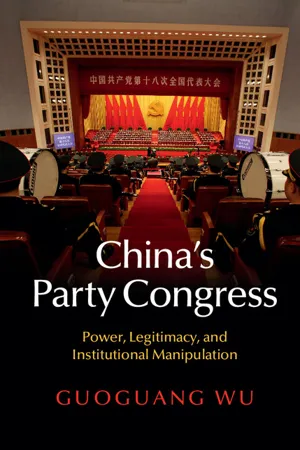
- English
- PDF
- Available on iOS & Android
About this book
Nominally the highest decision-making body in the Chinese Communist Party, the Party Congress is responsible for determining party policy and the selection of China's leaders. Guoguang Wu provides the first analysis of how the Party Congress operates to elect Party leadership and decide Party policy, and explores why such a formal performance of congress meetings, delegate discussions, and non-democratic elections is significant for authoritarian politics more broadly. Taking institutional inconsistency as the central research question, this study presents a new theory of 'mutual contextualization' to reveal how informal politics and formal institutions interact with each other. Wu argues that despite the prevalence of informal politics behind the scenes, authoritarian politics seeks legitimization through a combination of political manipulation and the ritual mobilization of formal institutions. This ambitious book is essential reading for all those interested in understanding contemporary China, and an innovative theoretical contribution to the study of comparative politics.
Frequently asked questions
- Essential is ideal for learners and professionals who enjoy exploring a wide range of subjects. Access the Essential Library with 800,000+ trusted titles and best-sellers across business, personal growth, and the humanities. Includes unlimited reading time and Standard Read Aloud voice.
- Complete: Perfect for advanced learners and researchers needing full, unrestricted access. Unlock 1.4M+ books across hundreds of subjects, including academic and specialized titles. The Complete Plan also includes advanced features like Premium Read Aloud and Research Assistant.
Please note we cannot support devices running on iOS 13 and Android 7 or earlier. Learn more about using the app.
Information
Table of contents
- Cover
- Half title
- Title
- Copyright
- Dedication
- Contents
- List of tables
- Acknowledgments
- 1 Introduction: China’s Party Congress as the theater of power
- 2 Institutions manipulated, legitimacy ritualized: a theory of authoritarian legitimization
- 3 “Meeting for unity and victory”: the political art of running the Party Congress
- 4 Between political principle and the practice of power: the making and remaking of the Party platform
- 5 Norms versus operations: the Party Constitution in political configuration
- 6 Elections as instruments of autocracy: the essence and nuisance of formalistic voting
- 7 Conclusion
- Bibliography
- Index